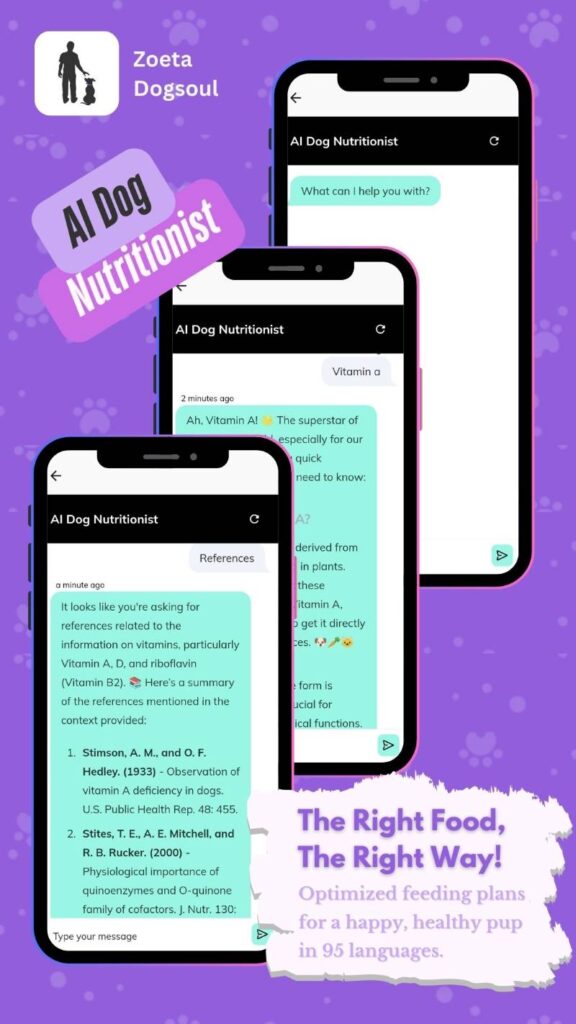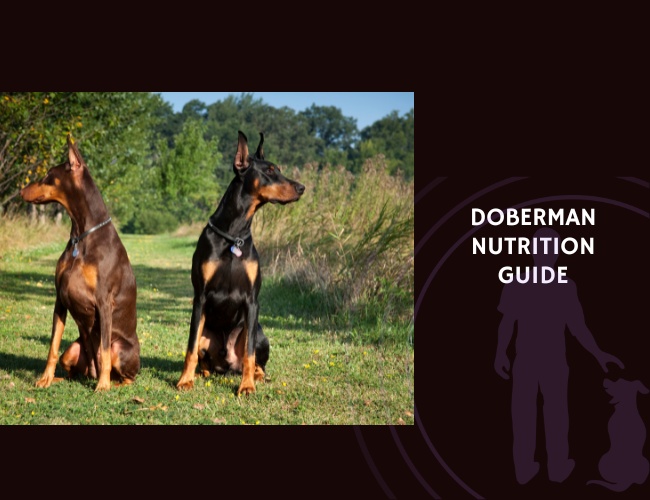The Doberman Pinscher stands as one of the most recognizable breeds in the canine world, with their sleek, athletic build and noble bearing telling a story of purposeful breeding and refined genetics. When it comes to nourishing these magnificent dogs, understanding their unique nutritional requirements isn’t just helpful—it’s essential for supporting their active lifestyle and preventing breed-specific health challenges. Let us guide you through the intricate world of Doberman nutrition, where science meets practical care, and where every meal contributes to your companion’s vitality and longevity.
Understanding Your Doberman’s Unique Metabolism
The Athletic Engine: How Dobermans Process Energy
Your Doberman’s metabolism operates like a finely-tuned sports car—efficient, powerful, and requiring premium fuel to perform at its best. These dogs possess a naturally high basal metabolic rate (BMR), which means they burn calories more quickly than many other breeds, even at rest. This metabolic efficiency stems from their lean muscle mass and active temperament, traits carefully cultivated through generations of selective breeding.
Key metabolic characteristics include:
- Higher calorie requirements per pound of body weight compared to less active breeds
- Rapid energy utilization during exercise and play
- Enhanced protein synthesis to maintain their characteristic muscular build
- Efficient thermoregulation that demands consistent energy supply
You might notice your Doberman seems to be always “on”—alert, ready for action, and burning through their food with impressive speed. This isn’t just perception; it’s their metabolism at work, converting nutrients into the energy that powers their vigilant nature and athletic capabilities.
Digestive System Specifics: What Makes Dobermans Different
The Doberman’s digestive system reflects their working dog heritage, designed for efficiency rather than bulk processing. Their relatively deep chest houses a stomach that, while proportionate to their size, sits in a configuration that makes them susceptible to certain digestive challenges. Understanding these anatomical quirks helps us make better feeding decisions.
Digestive traits to consider:
- Stomach positioning that increases bloat risk, especially with large meals
- Generally good digestive efficiency when fed appropriate foods
- Sensitive response to sudden dietary changes
- Optimal function with multiple smaller meals rather than single large feedings
Think of your Doberman’s digestive system as a precision instrument—it works beautifully when properly maintained but can be thrown off by sudden changes or inappropriate inputs. This sensitivity isn’t a weakness; it’s simply a characteristic that requires mindful management 🧡
Macronutrient Requirements: Building Blocks for Health
Protein: The Foundation of Doberman Nutrition
Protein serves as the cornerstone of your Doberman’s diet, supporting everything from muscle maintenance to immune function. These athletic dogs require a moderate-to-high protein intake to maintain their characteristic lean muscle mass and support their active lifestyle. But it’s not just about quantity—the quality and source of protein matter tremendously.
Adult Dobermans thrive on diets containing:
- 22-26% high-quality protein (dry matter basis) for active adults
- 26-30% protein for working or highly athletic individuals
- 18-22% protein for less active or senior dogs
The protein in your Doberman’s diet should come from easily digestible, complete sources. Animal proteins like chicken, turkey, fish, and lamb provide the full spectrum of amino acids your dog needs. You might notice your Doberman’s coat becomes glossier and their energy more sustained when protein levels are optimized—these visible signs reflect the internal benefits of proper protein nutrition.
Fat: Energy and Essential Nutrients
Fat often gets a bad reputation, but for your Doberman, it’s an essential macronutrient that provides concentrated energy and supports numerous bodily functions. The key lies in finding the right balance—enough to fuel their active lifestyle without contributing to unwanted weight gain.
Optimal fat levels for Dobermans:
- 12-16% fat for active adults (dry matter basis)
- 8-12% for less active or weight-management needs
- Higher levels (up to 20%) for working or sporting dogs
The type of fat matters as much as the amount. Omega-3 and omega-6 fatty acids play crucial roles in:
- Maintaining healthy skin and that signature glossy Doberman coat
- Supporting cognitive function and trainability
- Reducing inflammation in joints and muscles
- Enhancing immune system response
Did you know that the right fatty acid balance can actually help reduce your Doberman’s tendency toward skin sensitivities? This connection between nutrition and skin health demonstrates how every aspect of diet influences overall wellbeing.
Carbohydrates: The Controversial Component
Carbohydrates in canine nutrition spark debate, but for Dobermans, they serve important functions when chosen wisely. While dogs don’t have a specific carbohydrate requirement, these nutrients provide readily available energy and valuable fiber for digestive health.
Carbohydrate considerations for Dobermans:
- Choose complex carbohydrates over simple sugars
- Opt for easily digestible sources like sweet potatoes, brown rice, or oats
- Monitor individual tolerance—some Dobermans handle grains well, others don’t
- Use carbohydrates to provide 30-50% of total calories, adjusting based on activity
Your Doberman’s response to carbohydrates is highly individual. Some thrive on grain-inclusive diets, while others show improved energy and coat quality on grain-free formulations. Observing your dog’s response helps guide these decisions 🐾
Micronutrient Profile: The Hidden Heroes
Essential Vitamins for Doberman Health
While macronutrients provide the building blocks and energy, vitamins orchestrate the complex biochemical processes that keep your Doberman healthy. Each vitamin plays specific roles, and deficiencies can manifest in subtle ways before becoming serious health issues.
Critical vitamins for Dobermans include:
Vitamin A: Supporting vision, immune function, and cell growth. You’ll see its benefits in your Doberman’s bright eyes and healthy skin.
Vitamin D: Essential for calcium absorption and bone health—particularly important for this large, active breed.
Vitamin E: A powerful antioxidant that works alongside selenium to protect cells from damage. This becomes increasingly important as your Doberman ages.
B-Complex Vitamins: These water-soluble vitamins support energy metabolism, nerve function, and red blood cell formation. Active Dobermans may have higher B-vitamin needs due to increased metabolic demands.
The beauty of a well-formulated diet is that it provides these vitamins in proper proportions. However, certain life stages or health conditions may warrant supplementation under veterinary guidance.
Mineral Balance: Supporting Structure and Function
Minerals form the structural components of bones and teeth while also facilitating countless physiological processes. For Dobermans, certain minerals deserve special attention due to breed-specific considerations.
Key minerals and their importance:
Calcium and Phosphorus: These minerals must exist in proper ratio (ideally 1.2:1 to 1.4:1) to support bone health. Growing Doberman puppies are particularly sensitive to imbalances, which can contribute to developmental orthopedic diseases.
Zinc: Critical for immune function and skin health. Some Dobermans may have higher zinc requirements, and deficiency can manifest as skin lesions or poor coat quality.
Copper: Essential for iron absorption and connective tissue formation. However, some Dobermans may be prone to copper accumulation, making moderate levels important.
Selenium: Works synergistically with Vitamin E as an antioxidant. Given the Doberman’s predisposition to certain cancers, adequate antioxidant support is crucial.
Trace element balance is like conducting an orchestra—each player must perform their part without overwhelming the others. This delicate balance supports your Doberman’s overall health and longevity.
Common Food Sensitivities: Navigating Dietary Challenges
Identifying Food Sensitivities in Your Doberman
Food sensitivities can turn mealtime from a joy into a source of discomfort for your Doberman. These reactions, while not true allergies, can significantly impact quality of life. Understanding how to identify and manage sensitivities empowers you to make better dietary choices.
Common signs of food sensitivities include:
- Persistent itching, especially around the face, paws, and ears
- Recurrent ear infections despite proper cleaning
- Gastrointestinal upset (loose stools, excessive gas, vomiting)
- Skin issues including hot spots, redness, or hair loss
- Behavioral changes like restlessness or decreased appetite
You might notice these symptoms developing gradually, making them easy to overlook initially. The key is recognizing patterns—does your Doberman always seem itchy after eating certain foods? Do digestive issues follow specific meals?
Common Trigger Foods and Ingredients
While every Doberman is unique, certain ingredients more commonly trigger sensitivities in the breed. Understanding these common culprits helps you make informed decisions about your dog’s diet.
Frequently problematic ingredients:
- Protein sources: Beef, chicken, and dairy top the list of common triggers
- Grains: Wheat, corn, and soy can cause issues in sensitive individuals
- Additives: Artificial colors, flavors, and preservatives may trigger reactions
- Novel proteins: Sometimes even “hypoallergenic” proteins like venison can cause issues
The journey to identifying trigger foods often involves an elimination diet—a systematic approach to determining which ingredients cause problems. This process requires patience but yields invaluable information about your Doberman’s unique dietary needs 🧡

Life Stage Nutritional Adjustments
Puppy Nutrition: Building a Strong Foundation
Your Doberman puppy’s nutritional needs during their first year lay the groundwork for lifelong health. This critical period demands careful attention to both the quality and quantity of nutrients provided.
Puppy-specific requirements include:
- Higher caloric density to support rapid growth (3,500-4,000 kcal/kg dry matter)
- Increased protein levels (26-30%) for muscle and tissue development
- Controlled calcium and phosphorus to prevent developmental orthopedic diseases
- Multiple small meals (3-4 daily) to support steady growth
Growth rate matters tremendously for large breed puppies like Dobermans. Overfeeding or providing excessive calcium can lead to skeletal problems that persist into adulthood. The goal is steady, controlled growth rather than maximum speed.
Did you know that your Doberman puppy’s adult size is largely predetermined by genetics, not by how much you feed them? Overfeeding won’t make them bigger—it will only make them grow too quickly, potentially causing joint and bone problems.
Adult Maintenance: Supporting Peak Performance
Adult Dobermans between 1-7 years old have stabilized in their nutritional needs, but these requirements still vary based on activity level, metabolism, and overall health status.
Adult feeding considerations:
- Adjust calories based on activity (2,000-3,000 kcal/day for average adults)
- Maintain consistent protein levels (22-26%) for muscle maintenance
- Monitor body condition score regularly
- Consider splitting meals to reduce bloat risk
Your adult Doberman’s diet should support their lifestyle. A couch companion needs fewer calories than an agility competitor, but both require high-quality nutrition to maintain health. Regular body condition assessments help you fine-tune portion sizes.
Senior Care: Adapting to Changing Needs
As your Doberman enters their golden years (typically around 7-8 years old), their nutritional needs shift to support healthy aging and manage age-related changes.
Senior-specific adjustments include:
- Slightly reduced calories to prevent weight gain from decreased activity
- Moderate protein levels (18-22%) to support muscle mass while protecting kidney function
- Increased fiber for digestive health
- Enhanced antioxidant levels to combat cellular aging
- Joint support supplements like glucosamine and chondroitin
You might notice your senior Doberman becoming pickier about food or having difficulty with harder kibbles. These changes are normal and can be accommodated through diet modifications. The goal is maintaining quality of life while supporting healthy aging 🐾
Reproductive Nutrition: Supporting Mothers and Fathers
Breeding Dobermans have unique nutritional demands that extend beyond standard adult maintenance. These requirements ensure healthy pregnancies, optimal milk production, and maintained body condition throughout the reproductive process.
For pregnant and lactating females:
- Gradual calorie increase during pregnancy (up to 150% of maintenance by whelping)
- Peak energy needs during lactation (up to 300% of maintenance)
- Higher protein and fat levels to support fetal development and milk production
- Calcium supplementation only under veterinary guidance
For breeding males:
- Slight calorie increase during breeding season
- Emphasis on zinc and vitamin E for reproductive health
- Maintained body condition to ensure breeding capability
Supporting reproductive health through nutrition requires careful planning and often veterinary consultation to ensure all needs are met without creating imbalances.
Power. Precision. Nutrition.
Engineered for Performance
The Doberman Pinscher isn’t just a dog—it’s a living sculpture of speed, vigilance, and grace. That means its body demands more than average care. With a high basal metabolic rate, impressive muscle density, and an always-alert temperament, this breed burns through nutrients like a sports car burns fuel. You can’t afford shortcuts. Every gram of protein, every fatty acid ratio, and every micronutrient must match the Doberman’s physiological precision. This isn’t about feeding—it’s about fuelling.
Balancing Instinct and Science
You’re not just choosing between kibble and raw—you’re navigating breed-specific sensitivities, bloat risk, DCM predispositions, and food-triggered inflammation. From taurine levels to zinc ratios, the Doberman needs strategic nourishment. Puppyhood requires tight calcium-phosphorus control to protect fast-growing joints. Seniors benefit from antioxidant loading and gentle digestibility. Each stage is a new equation. The formula must shift, but the logic stays sharp: feed the dog, not the brand.



Your Role in Their Longevity
There is no off-the-shelf solution for a Doberman’s needs—only informed commitment. Are you reading ingredient panels like a biologist? Adjusting feeding plans with seasonal energy shifts? Monitoring stool quality, coat sheen, and muscle tone like biomarkers? That’s the level required. When you get it right, your Doberman shines—literally and figuratively. When you don’t, the fallout isn’t cosmetic—it’s cellular, cardiovascular, neurological. You control the outcome. Precision isn’t a luxury; it’s love..
Breed-Specific Health Risks: Nutritional Management Strategies
Dilated Cardiomyopathy (DCM): The Heart of the Matter
DCM represents one of the most serious health concerns for Dobermans, with nutritional factors playing a potential role in both development and management. While genetics primarily drive DCM risk, certain dietary considerations may help support heart health.
Nutritional strategies for DCM prevention and management:
- Ensure adequate taurine levels through diet or supplementation
- Include L-carnitine to support heart muscle function
- Maintain appropriate mineral balance, especially magnesium and potassium
- Consider omega-3 fatty acid supplementation for anti-inflammatory effects
Recent research has highlighted potential connections between certain grain-free diets and DCM development, though the relationship remains under investigation. The key is ensuring your Doberman receives complete and balanced nutrition regardless of grain inclusion.
You might wonder if you should supplement taurine preventively. While many Doberman owners choose this approach, consulting with your veterinarian helps determine the most appropriate strategy for your individual dog.
Gastric Dilatation-Volvulus (Bloat): A Life-Threatening Emergency
Bloat strikes fear into the hearts of Doberman owners, and rightfully so. This condition, where the stomach fills with gas and potentially twists, can be fatal within hours. While not purely nutritional, feeding practices significantly influence bloat risk.
Feeding strategies to reduce bloat risk:
- Feed multiple smaller meals rather than one large meal
- Avoid exercise for 1-2 hours before and after meals
- Use slow-feeder bowls to prevent rapid eating
- Elevate food bowls only if recommended by your veterinarian (controversial)
- Avoid foods that cause excessive gas production
- Maintain consistent feeding schedules
Creating a calm mealtime environment also helps. Stress and competition during feeding can increase air swallowing, contributing to bloat risk. If you have multiple dogs, consider feeding them separately to reduce mealtime anxiety.
Hip Dysplasia: Supporting Joint Health Through Nutrition
While hip dysplasia has a strong genetic component, nutrition plays a crucial role in its development and management. Proper feeding during puppyhood and throughout life can significantly impact joint health outcomes.
Nutritional strategies for joint health:
- Controlled growth rate during puppyhood
- Maintain ideal body weight to reduce joint stress
- Include omega-3 fatty acids for anti-inflammatory effects
- Consider joint supplements (glucosamine, chondroitin, MSM)
- Ensure adequate but not excessive calcium and phosphorus
Did you know that keeping your Doberman just slightly lean can add years to their life and significantly reduce arthritis symptoms? Every extra pound places additional stress on joints, accelerating wear and tear.
Pancreatitis: Managing Fat Intake
Dobermans can develop pancreatitis, an inflammation of the pancreas often triggered by high-fat meals or dietary indiscretion. Once a dog has experienced pancreatitis, they remain at higher risk for future episodes.
Preventive nutrition strategies:
- Maintain moderate fat levels in the regular diet
- Avoid sudden high-fat treats or table scraps
- Transition between foods gradually
- Monitor for signs of digestive upset
- Consider prescription low-fat diets for dogs with history of pancreatitis
The connection between diet and pancreatic health reminds us that every treat and meal contributes to overall health outcomes. Making conscious choices about what goes into your Doberman’s bowl is an act of preventive care 🧡

Recommended Feeding Methods: Finding What Works
Commercial Kibble: Convenience Meets Nutrition
High-quality commercial kibble remains the most popular feeding choice for Doberman owners, offering convenience and nutritional completeness when chosen carefully.
Selecting appropriate kibble involves:
- Reading ingredient lists carefully (first 5 ingredients matter most)
- Choosing foods meeting AAFCO standards for your dog’s life stage
- Selecting appropriate protein and fat levels
- Considering your Doberman’s individual sensitivities
- Evaluating cost versus quality
Not all kibbles are created equal. Premium brands often use higher-quality protein sources and fewer fillers, which can mean better digestibility and smaller serving sizes. You might notice your Doberman needs less of a high-quality food to maintain body condition compared to economy brands.
Raw Food Diets: Back to Nature?
Raw feeding has gained popularity among Doberman owners seeking a more “natural” approach to nutrition. This method can work well but requires significant commitment and knowledge.
Raw feeding considerations:
- Requires careful balancing of muscle meat, organs, and bones
- Demands strict food safety protocols
- May improve coat quality and reduce allergies in some dogs
- Costs more than most commercial diets
- Needs freezer space and meal planning
The decision to feed raw should involve consultation with a veterinary nutritionist to ensure nutritional completeness. Many Doberman owners report improved energy and coat quality on raw diets, but these benefits must be weighed against the additional effort and potential risks.
Home-Cooked Diets: Personalized Nutrition
Preparing home-cooked meals for your Doberman offers ultimate control over ingredients and quality. This approach particularly benefits dogs with multiple food sensitivities or specific health conditions.
Successful home cooking requires:
- Working with a veterinary nutritionist to formulate balanced recipes
- Consistent preparation and portioning
- Regular recipe rotation to ensure variety
- Appropriate supplementation to prevent deficiencies
- Time commitment for shopping and cooking
You might find that cooking for your Doberman strengthens your bond while providing peace of mind about ingredient quality. However, this method demands dedication and careful planning to avoid nutritional imbalances.
Combination Feeding: The Best of Both Worlds
Many Doberman owners find success combining different feeding methods, such as kibble base with fresh food toppers or rotating between commercial and home-prepared meals.
Benefits of combination feeding:
- Provides dietary variety
- Allows flexibility in scheduling
- Can improve palatability for picky eaters
- Offers nutritional insurance through variety
- Accommodates changing life circumstances
This flexible approach acknowledges that no single feeding method suits every dog or owner perfectly. Finding your unique balance takes experimentation but often yields excellent results 🐾
Practical Feeding Guidelines: Day-to-Day Management
Establishing Feeding Schedules
Consistency in feeding times helps regulate your Doberman’s digestive system and can prevent behavioral issues around food. Most adult Dobermans thrive on twice-daily feeding, though individual needs vary.
Optimal feeding schedule considerations:
- Puppies: 3-4 meals daily until 6 months, then transition to 2-3 meals
- Adults: 2 meals daily, spaced 8-12 hours apart
- Seniors: May benefit from smaller, more frequent meals
- Working dogs: May need additional meals or snacks around training
Your Doberman’s internal clock quickly adapts to consistent feeding times. You might notice them appearing at their bowl within minutes of usual feeding time—this predictability can actually help with house training and general routine establishment.
Portion Control and Body Condition
Determining appropriate portions requires considering your individual Doberman’s metabolism, activity level, and body condition rather than relying solely on feeding guides.
Body condition assessment involves:
- Feeling ribs easily with slight pressure (not visible but palpable)
- Visible waist when viewed from above
- Abdominal tuck when viewed from the side
- Muscle definition without excessive fat coverage
Regular body condition scoring helps you adjust portions before weight becomes a problem. Remember, it’s much easier to prevent obesity than to achieve weight loss in dogs.
Managing Feeding Challenges
Every Doberman owner eventually faces feeding challenges, whether picky eating, food guarding, or rapid consumption. Understanding how to address these issues maintains mealtime harmony.
Fast eaters: Use puzzle feeders, slow-feed bowls, or scatter feeding to slow consumption and provide mental stimulation.
Picky eaters: Rule out medical causes first, then try warming food slightly, adding small amounts of low-sodium broth, or rotating proteins.
Food guarding: Work with a professional trainer using positive reinforcement techniques. Never punish guarding behavior, as this can escalate aggression.
Begging: Establish clear boundaries and never feed from the table. Provide a designated spot away from the dining area during human meals.
These behavioral considerations remind us that feeding is about more than just nutrition—it’s a social and behavioral experience that shapes your relationship with your Doberman.
Treat and Supplement Integration
Treats and supplements can enhance your Doberman’s diet but must be factored into total daily caloric intake to prevent overfeeding.
Guidelines for treats and supplements:
- Treats should comprise no more than 10% of daily calories
- Choose single-ingredient treats for dogs with sensitivities
- Use training treats strategically—small, low-calorie options work best
- Introduce supplements gradually and monitor for reactions
- Coordinate supplements with your veterinarian to avoid interactions
Did you know that many Doberman owners successfully use their dog’s regular kibble as training treats? This approach prevents overfeeding while maintaining dietary consistency.
Monitoring and Adjusting: The Ongoing Journey
Regular Health Assessments
Nutritional success shows in your Doberman’s overall health and vitality. Regular assessments help you identify when dietary adjustments might be needed.
Key indicators of nutritional health:
- Glossy, smooth coat without excessive shedding
- Clear, bright eyes without discharge
- Consistent, firm stools
- Sustained energy appropriate to age
- Healthy body weight and muscle tone
- Good dental health
Changes in any of these areas might signal nutritional imbalances or the need for dietary modification. Your observation skills combined with regular veterinary checkups provide the best monitoring system.
Working with Your Veterinary Team
Your veterinarian and potentially a veterinary nutritionist form essential parts of your Doberman’s healthcare team. Regular consultations ensure nutritional strategies align with overall health management.
Topics to discuss with your vet:
- Annual bloodwork to identify nutritional deficiencies
- Body condition scoring and weight management
- Age-appropriate dietary transitions
- Management of health conditions through nutrition
- Supplement recommendations based on individual needs
Building a collaborative relationship with your veterinary team means your Doberman benefits from both your daily observations and professional expertise.
Staying Informed: Nutrition Science Evolves
Canine nutrition science continually advances, bringing new insights into optimal feeding practices. Staying informed helps you make evidence-based decisions for your Doberman.
Reliable sources for nutrition information:
- Veterinary nutrition specialists
- Peer-reviewed research studies
- Professional veterinary organizations
- Reputable breed-specific health organizations
- Board-certified veterinary nutritionists
Remember to approach new trends critically, considering whether they’re supported by science and appropriate for your individual Doberman. What works for one dog may not suit another, even within the same breed 🧡
Conclusion: Is Your Doberman’s Diet Supporting Their Best Life?
The journey through Doberman nutrition reveals the intricate connections between diet and every aspect of your dog’s health and happiness. From their unique metabolic needs to breed-specific health considerations, every nutritional decision contributes to their quality of life.
Your Doberman relies on you to make informed choices about their nutrition, balancing scientific knowledge with individual observation. Whether you choose commercial foods, raw feeding, home cooking, or a combination approach, the key lies in providing complete, balanced nutrition tailored to your dog’s specific needs.
As you continue this nutritional journey with your Doberman, remember that perfection isn’t the goal—consistent, thoughtful care is. Your attention to their dietary needs, combined with regular veterinary care and lots of love, gives your Doberman the foundation for a long, healthy, and vibrant life.
Take a moment to assess your current feeding practices. Are they supporting your Doberman’s unique needs? Are there areas where small adjustments might yield significant benefits? The answers to these questions guide your next steps in optimizing your faithful companion’s nutrition.
Your Doberman’s nutritional needs will evolve throughout their life, and your willingness to adapt and learn ensures they receive the best possible care at every stage. After all, these remarkable dogs give us their loyalty, protection, and unconditional love—providing them with optimal nutrition is one beautiful way we can return that devotion 🐾










